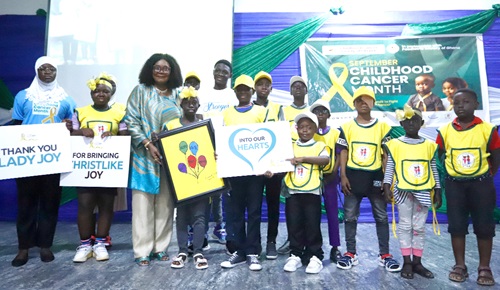Although Ghana is expected to see between 1200 to 1500 childhood cancer cases annually, only a third of the cases are seen at treatment centres.
This is largely due to challenges such as the inability of parents to know what the child has could be cancer and the inability by some hospitals to diagnose cases as cancer.
Actual cases of childhood cancer, therefore, seen yearly across the three childhood cancer treatment centres in the country are between 400 to 500.
The centres are the Korle Bu Teaching Hospital (KBTH), which is the largest centre in the country, the Komfo Anokye Teaching Hospital and the Greater Accra Regional Hospital (GARH).
For the KBTH, between 200 to 220 new cases of childhood cancer are seen yearly.
A paediatric oncologist at the KBTH, Dr Lily Gloria Tagoe, made this known in Accra yesterday at the launch of Childhood Cancer Awareness Month.
September is observed worldwide as Childhood Cancer Awareness Month and for Ghana, the Childhood Cancer Society of Ghana (GCSG) is spearheading the celebration in partnership with the Paediatric Society of Ghana on the theme: “Joining hands to fight childhood cancer”.
About 400,000 children under 19 years get cancer in the world each year. When diagnosed early enough and treated with the appropriate protocols, more than 80 per cent of childhood cancers are curable.
Delays
“It’s alarming to me that we are missing two-thirds of them and they are not getting to the hospital. We know that as we do more advocacy, we are going to eventually start seeing more children, even more than the 400 to 500 we are currently seeing and catching more of those we used to miss,” she said.
Dr Tagoe explained that the delays in diagnosing childhood cancers had negative implications for treatment and survival, hence the cases needed to be detected early.
She said whereas in high-income countries the survival rate was over 80 per cent and 20 per cent for low-income countries, in Ghana, the survival rate for childhood cancers is 50 per cent.
Dr Tagoe said, however, that for Wilms tumour, which was kidney cancer that occurred in children, those seen at stage one or two, the survival rates were more than 70 to 80 per cent.
On the treatment cost for childhood cancers, Dr Tagoe said it could be as little as GHc12,000 and as high as GHc120,000, adding that now that prices of things had skyrocketed, the figures could be more.
“So it is very concerning and very difficult for most parent, because cancer doesn’t know social strata; it doesn’t know your financial status. It can occur to anybody, from the unemployed family to the rich family, everybody’s child can get cancer,” she said.
She appealed to individuals and companies to support childhood cancer treatment through blood donation, advocacy and provision of funds.
“We need to support them so that when patients come to the hospitals, they don’t need to worry about the next treatment or the money for it,” she said.
Activities
The President of the Childhood Cancer Society of Ghana, Professor Lorna Awo Renner, mentioned the activities planned for the month-long celebration to be a health walk; a webinar, media interviews and visits to schools and markets to create awareness of childhood cancer.
Touching on the theme of the celebration, the wife of the founder of the International Central Gospel Church, Joy Otabil, said through the collective and collaborative efforts of many people contributing to research and development, education and training, policy and governance, resources and finances, they could deal with and minimise the impact of childhood cancer in Ghana.
During a panel discussion on the theme, representatives from UNICEF, World Child Cancer, a parent whose child has cancer and a paediatric oncologist, stressed the need for increased awareness of childhood cancer, increasing funding for it, education on early detection signs and for the government to put in more effort.
ALSO READ:

